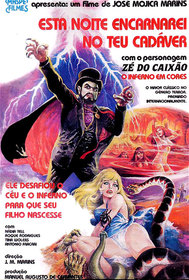Our editor-in-chief Nate Yapp is proud to have contributed to the new book Hidden Horror: A Celebration of 101 Underrated and Overlooked Fright Flicks, edited by Aaron Christensen. Another contributors include Anthony Timpone, B.J. Colangelo, Dave Alexander, Classic-Horror.com's own Robert C. Ring and John W. Bowen. Pick up a copy today from Amazon.com!
This Night I'll Possess Your Corpse (1967)
The sequel to At Midnight I'll Take Your Soul (which is touted as Brazil's first horror film), This Night I'll Possess Your Corpse has a lot more going for it than just an amazing title. While often 'cult' films are fueled by a strange fervor that has nothing to do with any actual merit to the film itself, This Night I'll Possess Your Corpse manages to be something unique and special. It combines rampant sexuality with grotesque curiosity, yet still touts Christian morals. While it's definitely not something you'll always want to pop into your DVD player, the film is one that you'll find yourself mentally dwelling on more than might be healthy. But make no mistake, unless you have a healthy morbid curiosity, you're probably better off leaving this film alone.
The film picks up directly after At Midnight I'll Take Your Soul, and it is nice enough to even say this right at the opening of the movie. We are quickly introduced to Zé do Caixão, or Coffin Joe, who ended the previous film with horrific eye injuries and being caught for two murders. Within five minutes of screen time, he is recovered from his injuries and found not guilty by a court of law due to lack of evidence. Thus, we embark on following the misadventures of Coffin Joe, a man driven by his obsession to father a son, to give him some sort of immortality. His first efforts involve kidnapping women and subjecting them to Fear Factor style tests, but eventually pure luck has him stumble upon the woman who would carry his child. All is not won, however, as his evil deeds, his own conscience, and his enemies soon catch up to poor, terrible Coffin Joe.
What really stands out in this film is the visuals. Take, for instance, the scene where Coffin Joe tests his would-be brides by releasing a horde of spiders into the room where they all sleep (in see-through nightgowns and prominently contrasting black underwear). Here the film is both highly erotic in the way it shoots the sleeping forms of the women, and also terrifyingly horrific due to the inclusion of this multitude of large black spiders climbing everywhere. We see this especially in one particular shot, with a spider crawling its way right up between the breasts of one particularly unlucky woman. The film is forcing a wonderful polarization, titillation tinged with terror. The film is unabashedly enticing you with these shots of womanly body parts, and then does its best to disgust be perverting those images with grotesque creatures and the like. Other sequences, such as sex paired with snake attack, provide more of this same dichotomy. But there is more to the visuals than boobs and bile. These shots are well constructed, the lighting is always stark, giving good contrast and keeps the details of the film clear. We are not seeing some shoddily produced horror film, this is a lovingly crafted work.
The film is more than simply striking to the eyes. Theologically, This Night I Will Possess Your Corpse portrays a classic battle between Atheism and spirituality. Coffin Joe himself is a man who defies the existence of the Christian God or any other supernatural force. His only belief is in the power of man and his mind; his belief in immortality is focused only in the idea of progeny. Coffin Joe gloats and expounds his beliefs in Bond villain fashion; when a man he is about to kill pleads for God's mercy, Coffin Joe taunts him and says that God doesn't exist. He leaves it to a test, where he lights the rope suspending a rock over the victim's head on fire. He says that he will leave the man's fate up to God. If god exists, he will extinguish the fire and save the poor man. Of course, the fire burns through the rope and the man's head is crushed. This isn't to say the film is championing atheism; in fact it is doing quite the opposite. While Coffin Joe is our main character, we do not truly sympathize with him at any point. He is a pathetic creature, a man who revels in torture and taunting his victims. His views are supposed to be sick, perverted, and disgusting, therefore his theological views end up appraised as equally despicable. When the climax of the film has Coffin Joe begging to God for mercy, well, that speaks for itself.
The theology and the visuals combine most effectively when the film delves into Coffin Joe's dream sequence of hell. The scene stands out visually not only by the sudden jump from black and white into color, but also by its amazingly abstract portrayal of the pit of torment. Red demons hop about with tridents and whips, flailing on limbs of poor souls that appear melded into the very floor and walls. The scene has not a single iota of realism. The walls resemble a cheap set from Doctor Who, and the demons are caricature-like in their makeup and costumes. And yet, the sheer lack of realism actually makes the visuals feel more effective. What we are seeing feels all the more like hell because it is so unreal. Coffin Joe screams again and again that it cannot be real, that hell does not exist, but with each denial the vision only grows more and more believable. The film is making a broad statement, that abstract ideas such as heaven and hell are far more real than the emptiness that atheism preaches.
However, the most interesting part of the film is the reversal of the Universal monster film cliché. While normally you have Frankenstein or the Wolf Man showing how human they truly are before they are hunted down by that terrible lynch mob, we have the opposite here. Instead, Coffin Joe is no more than a sadistic man, a human in which we see madness and monstrosity. Coffin Joe himself isn't even much of a physical monster at a mere five and a half feet tall, even with his long, nasty fingernails. With his top hat and beard, he looks the part of an old time undertaker, but never does he seem truly imposing. His menace, therefore, is all in his personality and his mind. The story here is praising society over the individual, of conformity and good over the twisted individual, who is far more monstrous than any Wolf Man.
In the end, This Night I'll Possess Your Corpse boils down to an experience that your average viewer won't want to stomach. The visuals may be impressive, the philosophy maybe interesting, and the breaks from monster movie norms may make for a breath of fresh air, but it might just be a little too weird for most. But as a cult film, those who can appreciate the flaws with the diamond will find that the film makes for great midnight viewing.
This review is part of Mexico / South America Week, the first of five celebrations of international horror done for our Shocktober 2008 event.








